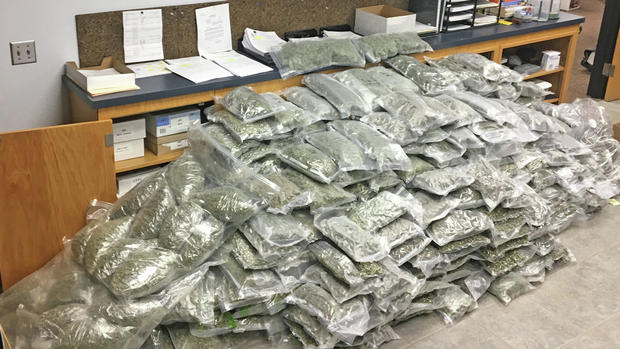Study Shows Legalized Marijuana in Other States Produced “Demonstrable and Persistent” Benefit for Law Enforcement

An Interstate 94 traffic stop the morning of Jan. 21, 2018, about 8 miles east of Jamestown, N.D., resulted in a Stutsman County deputy seizing 476 pounds of marijuana. Special to The Forum
Earlier this month, shortly after activists supporting a ballot measure to legalize recreational marijuana in North Dakota turned in their signatures, I hosted a radio show featuring the proponents of the measure as well as a law enforcement official who opposes it.
You can listen here. During the show Stutsman County Sheriff Chad Kaiser, speaking on behalf of the North Dakota Sheriff’s and Deputies Association, argued that legalization would create new headaches for law enforcement.
It’s a not uncommon argument from opponents of marijuana legalization. To hear them tell it, legalization has a deleterious impact on public safety. “Look at Colorado,” they often tell us. “Look at Washington.”
Well, according to a Washington State University study which looked at crime statistics in Washington and Colorado the legalization of marijuana there has “produced some demonstrable and persistent benefit” to law enforcement.
You can read the study here. From the abstract:
Specific to public safety, advocates of legalization expected improvements in police effectiveness through the reduction in police time and attention to cannabis offenses, thus allowing them to reallocate resources to more serious offenses. Using 2010 to 2015 Uniform Crime Reports data, the research undertakes interrupted time-series analysis on the offenses known to be cleared by arrest to create monthly counts of violent and property crime clearance rate as well as disaggregated counts by crime type. Findings suggest no negative effects of legalization on crime clearance rates. Moreover, evidence suggests some crime clearance rates have improved. Our findings suggest legalization has resulted in improvements in some clearance rates.
They do have some caveats, as they explained to the Washington Post, but they do feel it’s safe to conclude that legalization was beneficial:
The researchers stress, however, that the data can’t prove conclusively that legalization directly caused the changes in clearance rates. There could have been other changes to policing in those states during that time period, such as increased use of overtime hours, the implementation of new policing strategies or a more aggressive focus on certain types of crime.
They note, however, that no other major changes to public policy happened in those states that would affect clearance rates in the way they observed. “We think the argument that legalization did in fact produce a measurable impact on clearance rates is plausible,” they conclude.
But even if the case for marijuana legalization improving clearance rates is inconclusive, at the very least there’s no evidence that it had a negative impact:
Advocates for legalization have frequently argued that freeing police from the burden of low-level marijuana enforcement would allow them to devote resources to more serious crimes. The Washington State researchers say their findings support this idea: “Our results suggest that, just as marijuana legalization proponents argued, the legalization of marijuana influenced police outcomes, which in the context of this article is modeled as improvements in clearance rates.”
They note, furthermore, that “there were no crime types in either state for which legalization appeared to have a negative impact on clearance rates.”
Marijuana legalization is a charged political topic, and it will generate a lot of debate here in North Dakota. We’ll hear from the law enforcement community who will, and already is per the interview linked above, argue that legalization will make their jobs harder.
But is that really the case? Based on what we see in Washington and Colorado I’m not so sure.
What is true is that there are a lot of people served by the status quo, from the addiction counseling industry which enjoys a lot of business from marijuana offenders sentenced to treatment to law enforcement agencies who can use pot busts to bolster the case for larger budgets, more equipment, and more personnel.
There is a saying, called the Shirky Principle, which holds that “Institutions will try to preserve the problem to which they are the solution.”
It’s something to be aware of in the debate over legalizing marijuana.




